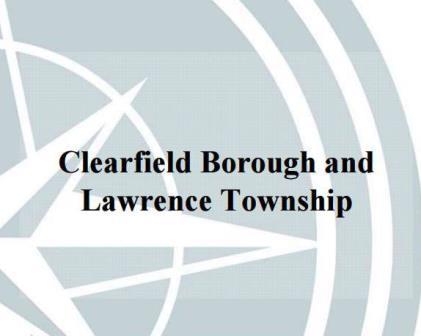CLEARFIELD – The Clearfield Borough-Lawrence Township Joint Consolidation Committee met last night to review some changes to the proposed charter and to go over some other items for suggested changes.
Matthew Domines of the Pennsylvania Economy League, which has been working with the committee on consolidation, reviewed the changes and discussed different points with the committee.
First, members of the council will have term limits and serve no more than three consecutive terms regardless of whether they are elected by district or at large.
This means that if they serve three consecutive terms as an at-large member, they cannot then serve as a representative of a district.
Also, they must reside for at least one consecutive year in the municipality prior to the general election and also be a registered voter.
Changes in compensation adjustments would be no more than 10 percent and be by ordinance unless agreed on by a super majority of the council.
When it comes to a vacancy on the council mid-term, the vacancy will be filled by the vacancy board within 30 days, and the board will be made up of the remaining council members.
Domines asked about legal action, especially in regards to subpoenas, as to who would sign one. After some discussion, the committee temporarily deferred the question.
Reorganization of the council was discussed as to whether it would be annually or every two years.
The committee agreed to have the council reorganize every year, especially because as the new government gets under way it could be helpful.
If the council would then decide to change that, it would require an amendment to the charter by voter referendum.
Also, there would be at least one meeting per month and special or rescheduled meetings would require advertisement in a local newspaper of general circulation at least 24 hours prior to the meeting and will also be on the municipality’s Web site.
Special meetings, held only for the purpose called, would be called either by the mayor, president or by written request of four council members. General agendas for meetings would be posted at the municipal building at least 24 hours prior to the meeting.
An emergency meeting, which would only be called in a real emergency with a clear and present danger to property or the public, could be called by the mayor, president or four council members without 24-hour notice.
The council will also appoint other positions, such as solicitor, engineer, etc. at the reorganization meeting and the name for these positions suggested was “professional services.”
Other items determined were the makeup of a quorum (a majority of members unless noted elsewhere), when minutes of meetings would be available to the public, that the mayor or council members would not be able to direct the work of employees, that citizens will have the right to address council during meetings, and that council members with financial interest in a matter cannot participate in discussion or in voting on the matter.
The office of mayor is the ceremonial head of the municipality, and can declare emergencies and serve on committees, but has no veto power. The president of council can also declare emergencies.
Ordinances were also discussed and will closely resemble what they are now. However, there was some disagreement with what was proposed in the charter, to the surprise of the representatives of PEL.
When discussing public hearings, one of the items that would prompt a hearing was the annual operating budget and both Borough Manager Leslie Stott and Township Secretary Barbara Shaffner stated neither municipality does this.
They hold budget workshops, which are open to the public, and make the proposed budget open to the public for review and comment prior to adoption before the end of the year.
PEL representative Harry Miller said other home rule municipalities have a public hearing prior to adoption and that is it a set time for the public to express thoughts and concerns about the budget.
Township and borough representatives on the committee noted that the public members often express their opinions during regular public meetings and 30 days or more of review, as well as making the workshops open to the public, seem like more than enough.
After considerable discussion, committee member Alan Walker suggested they set the matter aside for now and return to it at a later time.
Other times briefly touched on were the rules for ordinances outlined in the charter, including emergency ordinances, and penalties for violating ordinances.
The manager of the municipality will be appointed by resolution as a full-time employee and will be the chief administrative officer and can only be removed by resolution of the council.
At this point, the committee agreed to resume review of the charter at the next meeting.
Co-chairman Bill Lawhead asked about some concerned raised by the public concerning stormwater drainage, etc.
Domines said he spoke with Randy Albert of the state Department of Transportation and Albert essentially said it will depend on how the new municipality classifies itself and other decisions.
Domines suggested they could have Albert attend a meeting and discuss the matter more fully with the committee.
Walker also addressed rumors he has heard that once the municipality is formed that the only post office they will have will be the Clearfield one and the other post offices serving the township will be closed.
He said this is not true, that the local governments have no control over post offices, that determination is made by the federal government, and those post offices will remain open regardless of the status of Clearfield and Lawrence Township. Closure would affect other municipalities as well. For example, Olanta serves portions of Lawrence, Knox and Pike townships.
The next joint committee meeting will be May 24 at 6 p.m. The meetings are open to the public and residents may attend and address questions and concerns to the committee.
